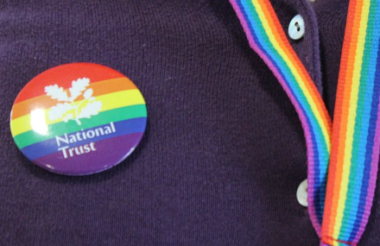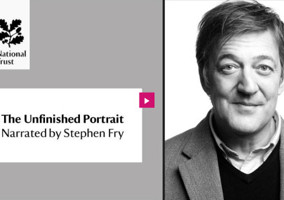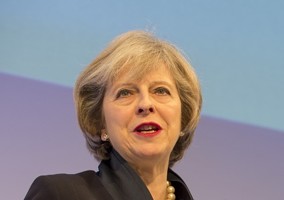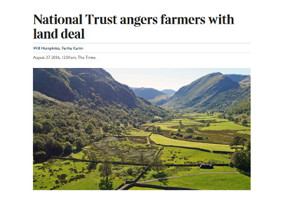Kirsty Weakley takes a look at how an argument between the National Trust and some volunteers unfolded.
Over the weekend the National Trust faced widespread criticism over, and was forced into an embarrassing u-turn on, a policy requiring volunteers to wear rainbow badges and lanyards.
The charity has been accused of pressuring volunteers to do something they feel uncomfortable with, exploiting the private life of the former owner of one of its properties, and straying into territory it shouldn’t be.
But was any of it deserved? Has the National Trust behaved appropriately? If not, is there anything that could have been done to stop the story spiralling out of control?
How did the row unfold?
In fact the National Trust announced its Prejudice and Pride programme in December last year.
As part of this the charity created on a new short documentary about the late owner of Felbrigg Hall, Robert Wyndham Ketton-Cremer. It worked in parthership with Professor Richard Sandell from the University of Leicester on ‘The Unfinished Portrait’ and enlisted Stephen Fry to narrate it, with the aim of sharing a “fuller” history than it had previously been able to do.
Sandell said: “I would strongly argue that we cannot perpetuate the values and attitudes of the past. You would only continue to conceal these truths if there was still a stigma attached to being gay. It is important to people today that we talk openly – just as we do about the personal lives of people who were heterosexual."
But last week’s row started after a local paper, the Eastern Daily Press reported that ten volunteers had been sent home after refusing to wear the badge and lanyard.
At this point the charity refused to back down and issued its first statement saying that volunteers are expected to “uphold the values of the organisation”.
The story was followed up by the Telegraph and then by the Mail (by which point there were “up to 75 volunteers” and the charity was facing a “mutiny”), which put it on the front page of its Saturday edition.
At this point the National Trust decided to issue a further statement saying that actually the badges were “optional”.
This was a gift to the many publications as they could use the word ‘u-turn’ in a headline, and just repeat the original complaints.
It has also prompted widespread analysis and commentary.
- For the Mail Katie Hopkins accuses the charity of going “the full Kim Jong Un” for forcing staff to wear the badges.
- Also in the Mail Harry Mount suggested that the episode was another example “of the mindset at the top of the organisation that is alienating members and the volunteers who are the Trust’s lifeblood”.
- In the Times Libby Purves wrote of “danger in coercive liberalism, one-note righteousness and the guilt-tripping of harmless guides as if they bore a share of blame for old oppression”.
- A Telegraph leader article “claimed a small victory” when the trust changed its policy.
But the story refused to go away and has been discussed at length on social media platforms. Former minister for civil society, Rob Wilson, called for chief executive Helen Ghosh, who is set to leave the charity next year, to go immediately.
Dreadful Dame Helen Ghosh suggests "volunteers step back" from @nationaltrust service. Better to go now not 2018. https://t.co/EZ7OarMcdD
— Rob Wilson (@RobWilson_RDG) August 5, 2017
Should the National Trust have ‘outed’ someone?
One of the main objections, which has been voiced by both former volunteers and his godchildren, is that the charity has intruded on Ketton-Cremer’s private life for commercial gain.
It’s an interesting dilemma both from a journalistic and historical perspective. How much of an individual’s private life should remain private after their death?
But importantly the National Trust maintains that it did not out Ketton-Cremer; that his acquaintances were aware at the time and that it has drawn on available historical sources and worked with an academic to reach its conclusion.
Ketton-Cremer himself was a biographer, which leads me to side with the charity’s argument that when he left his works to them, he expected them to be read.
“As a renowned researcher who studied and published biographies of important literary persons in the past with integrity, he would most likely have known that future research on his works, life and times might be studied and published, many of which were included in his bequest to the National Trust,” the charity said.
And it's right. While a large part of the charity’s work is about the conservation of physical land and property, anyone who has ever visited any of its stately homes will know that it also puts great effort into explaining the lifestyles of the people who used to live there.
Should volunteers be made to wear gay pride badges?
This is a really difficult question to answer. Obviously nobody likes the idea of someone who has volunteered their time being pressured or made to feel uncomfortable - and pushed into a backroom when they won't go along with something.
But on the other hand, the National Trust’s initial position that volunteers are acting as ambassadors and that means they should be signed up to the charity’s values, is correct. And the vast majority of the National Trust's volunteers do seem to have embraced the Prejudice and Pride events without complaint - it doesn't seem right to hold back the many because of the outdated views of a few.
If this had been about events marking a different anniversary I doubt there would have been this much controversy. Would it be okay for volunteers to say that they didn’t want to take part in celebrations of women getting the vote? Or the parts played by black, Asian or other ethnic minorities in our history?
I think not. I imagine a volunteer who phoned their local newspaper to complain and said: “I’m disgusted, the National Trust has just sent me home for refusing to wear a badge celebrating votes for women.”
The reporter would have hung up the phone, had a good laugh, and moved on with their day.
It’s unfortunate that the same attitude towards gay rights has not yet been embedded in the same way. Should charities accept that the world has not moved on as far with gay rights, and accept people's right to their views, or should charities have a duty to change them?
Whatever the answer is, it shows that there is a need for extreme sensitivity around such issues, when handling volunteers.
What could the charity have done?
While this clearly has the feel of another media witch hunt against the National Trust, I don’t think the charity is blameless.
Its first statement was quite combative and dismissive – I can’t help but feel the charity could have done more to nip this in the bud with volunteers on the ground when the first local news story appeared, rather than allow the row to escalate, and provide the right-wing press with another opportunity of a bit of charity bashing.
The charity appeared slow to appreciate how the situation could spiral. It was not until the Mail put the story on its front page that the charity changed its stance.
In my view this was another mistake. Having taken a firm stand. ‘These are our values, participate or stay away’ the charity should have stuck to them. By reversing its position this late in the day, it afforded the newspapers the opportunity to repeat the original allegations.
The tragedy of this episode is that what was supposed to be an important contribution to social history has been overshadowed by an uncomfortable and unpleasant public row.
Related articles












